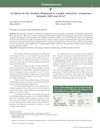 2 citations,
July 2014 in “Irish Journal of Medical Science”
2 citations,
July 2014 in “Irish Journal of Medical Science” The meeting discussed medical findings, including benefits of certain treatments for cancer and heart conditions, and highlighted issues like poor adherence to preventive measures and skill gaps among interns.
 September 2010 in “Companion Animal”
September 2010 in “Companion Animal” The guide explains how to diagnose and treat hair loss in dogs, covering causes and treatments, with some conditions lacking treatment options.
 12 citations,
January 2013 in “Bundesgesundheitsblatt - Gesundheitsforschung - Gesundheitsschutz”
12 citations,
January 2013 in “Bundesgesundheitsblatt - Gesundheitsforschung - Gesundheitsschutz” Older adults still engage in sexual activities but face challenges like health issues and lack of professional support, highlighting the need for better healthcare provider education and research on sexual fulfillment in old age.
January 2023 in “Frontiers in Medicine” ALRV5XR is the most effective hair regrowth treatment at 24 weeks.
 April 2012 in “Annals of Neurosciences”
April 2012 in “Annals of Neurosciences” The document concludes that stem cell therapies lack solid proof of effectiveness, except for blood system treatments, and criticizes the ethical issues and commercial exploitation in the field.
 6 citations,
August 2023 in “Fertility and Sterility”
6 citations,
August 2023 in “Fertility and Sterility” The 2023 guideline for PCOS suggests using updated diagnostic criteria, assessing related health risks, and recommends lifestyle changes and specific treatments for symptoms and fertility issues.
 3 citations,
December 2020 in “Polski merkuriusz lekarski : organ Polskiego Towarzystwa Lekarskiego”
3 citations,
December 2020 in “Polski merkuriusz lekarski : organ Polskiego Towarzystwa Lekarskiego” People with androgenetic alopecia often experience high stress, but the stress doesn't affect how the disease progresses or how well different treatments work.
 3 citations,
January 2021 in “Plastic and Aesthetic Research”
3 citations,
January 2021 in “Plastic and Aesthetic Research” Hair loss reduces hair thickness and coverage, but drug treatments mainly revive dormant hairs rather than reverse thinning; patients often undervalue their hair loss severity.
 January 2018 in “Springer eBooks”
January 2018 in “Springer eBooks” Hidradenitis Suppurativa is likely an autoinflammatory disease, and better understanding its causes could improve treatments.
 7 citations,
January 2018 in “Skin appendage disorders”
7 citations,
January 2018 in “Skin appendage disorders” The document suggests recognizing "trichiatrists" as doctors specializing in hair and scalp health, using evidence-based treatments.
 May 2023 in “Journal of managed care & specialty pharmacy”
May 2023 in “Journal of managed care & specialty pharmacy” Alopecia areata causes hair loss and life quality issues; current treatments are often unsatisfactory, but new drugs like JAK inhibitors show promise.
 13 citations,
January 2014 in “Journal of Investigative Dermatology”
13 citations,
January 2014 in “Journal of Investigative Dermatology” The laser comb did not improve hair regrowth in mice with alopecia areata.
 June 2001 in “Annals of Internal Medicine”
June 2001 in “Annals of Internal Medicine” The document concludes that more research is needed on the hepatitis B vaccine's side effects and the effectiveness of certain treatments for specific diseases.
 July 2017 in “Cardiologia Croatica”
July 2017 in “Cardiologia Croatica” Metabolic syndrome's individual issues are real and need treatment to reduce diabetes and heart disease risks.
2 citations,
July 2022 in “Sexual Medicine” Certain medications, especially 5-α reductase inhibitors and neuropsychiatric drugs, are often linked to erectile dysfunction.
 42 citations,
September 2018 in “Journal der Deutschen Dermatologischen Gesellschaft”
42 citations,
September 2018 in “Journal der Deutschen Dermatologischen Gesellschaft” Adult female acne requires a comprehensive treatment approach, including medical options and lifestyle changes, with attention to psychological well-being.
 30 citations,
October 2014 in “Journal of The American Academy of Dermatology”
30 citations,
October 2014 in “Journal of The American Academy of Dermatology” A team approach is crucial for managing PCOS, with dermatologists playing a key role.
 April 2024 in “ScienceRise. Pharmaceutical science”
April 2024 in “ScienceRise. Pharmaceutical science” Men with hair loss feel it affects their emotions and life quality, and want more effective treatments.
 11 citations,
June 2017 in “Anais Brasileiros de Dermatologia”
11 citations,
June 2017 in “Anais Brasileiros de Dermatologia” More people were diagnosed with certain skin diseases and sexually transmitted diseases in 2014 compared to 2003 in a Brazilian public institution.
 April 2024 in “Dermatovenerologiâ, kosmetologiâ”
April 2024 in “Dermatovenerologiâ, kosmetologiâ” Actinic keratosis is a sun-induced skin condition that can potentially turn into skin cancer and requires various treatments to prevent this.
 13 citations,
December 2010 in “Annales de Dermatologie et de Vénéréologie”
13 citations,
December 2010 in “Annales de Dermatologie et de Vénéréologie” The conclusion is that skin, mucous, and eye problems after Stevens-Johnson syndrome and Lyell syndrome significantly affect patients' lives, highlighting the need for comprehensive care and eye check-ups.
 1 citations,
December 2019 in “Formuly farmacii”
1 citations,
December 2019 in “Formuly farmacii” Many people suffer from hair loss, which is caused by a disruption in hair growth, and there is a need for personalized treatments and new drugs.
 35 citations,
October 2012 in “Dermatologic Clinics”
35 citations,
October 2012 in “Dermatologic Clinics” Autoimmune diseases can cause hair loss, and early treatment is important to prevent permanent damage.
 88 citations,
July 2014 in “Journal of the American Academy of Dermatology”
88 citations,
July 2014 in “Journal of the American Academy of Dermatology” Targeted cancer therapies often cause skin reactions, so dermatologists must manage these effects.
 September 2024 in “Journal of Clinical Medicine”
September 2024 in “Journal of Clinical Medicine” Permanent makeup can cause delayed allergic reactions, but they can be managed with proper treatment.
 October 2024 in “Cosmoderma”
October 2024 in “Cosmoderma” Proper hair care and suitable products are essential for men's scalp health and well-being.
 1 citations,
January 2009 in “Elsevier eBooks”
1 citations,
January 2009 in “Elsevier eBooks” The document concludes that a deeper understanding of skin aging and photodamage is needed to create better skin treatments.
 37 citations,
January 1997 in “Clinics in Dermatology”
37 citations,
January 1997 in “Clinics in Dermatology” Hair problems are common and distressing for women, but increasing knowledge of treatments offers hope.
 5 citations,
November 2021 in “Skin appendage disorders”
5 citations,
November 2021 in “Skin appendage disorders” Hair loss can cause stress and mental health issues, so treatments should address both the physical and psychological aspects, involving a team of dermatologists, psychologists, and hair specialists.

Preparing and learning about menopause can improve women's quality of life as they approach this phase.



























